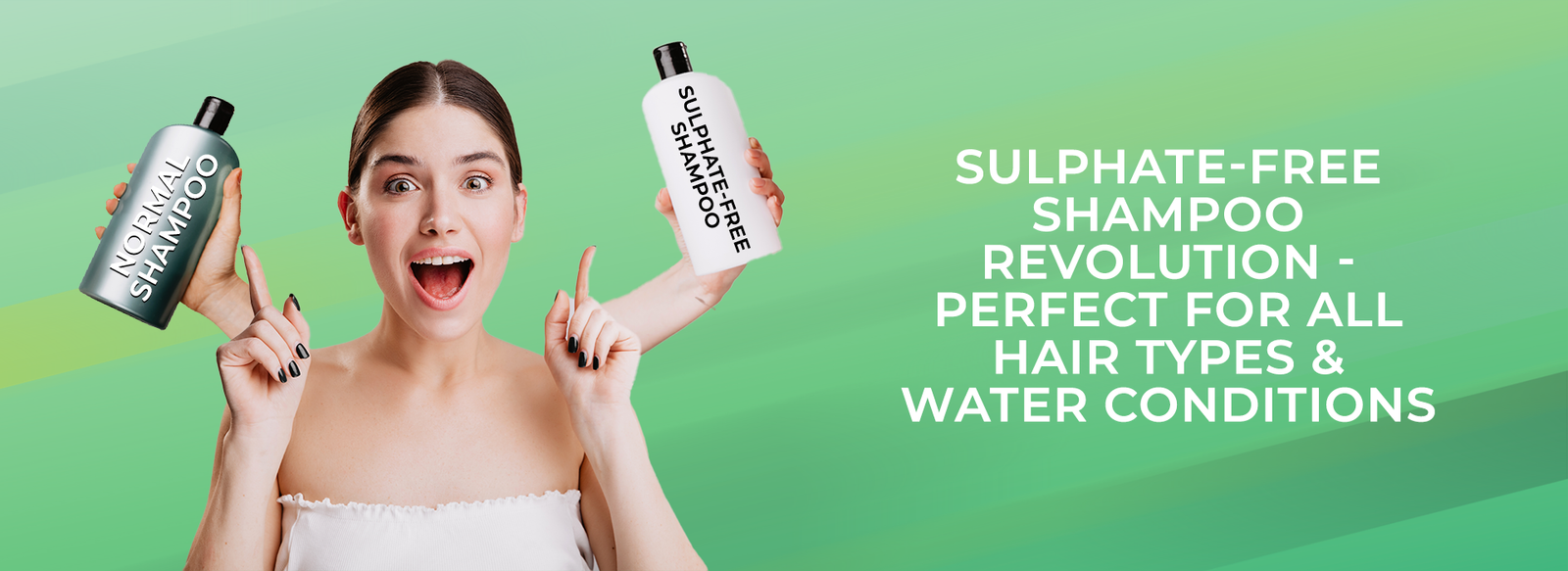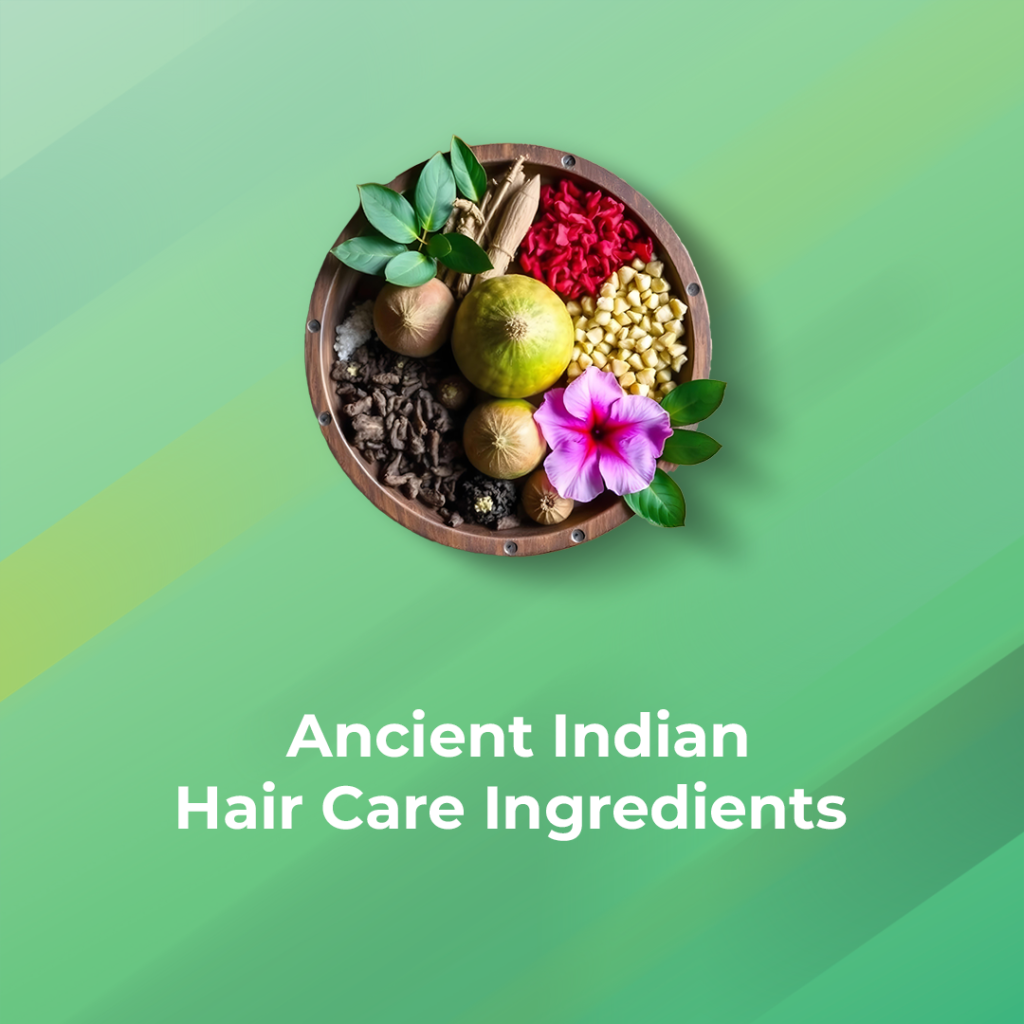
Discover the Power of Sulphate-Free Shampoos for All Hair Types & Water Conditions
Introduction
Sulphate-free shampoos have taken the hair care world by storm. They are celebrated for their gentleness, adaptability to diverse hair types, and even challenging water conditions like hard water. For Indian hair, often treated with nourishing oils, sulphate-free shampoos are especially beneficial because they cleanse without completely stripping away these valuable oils. Let’s explore sulphate-free shampoos, why they’re helpful, and the best ways to use them for all hair types.
Sulphate-free shampoos are formulated without sulfates—ingredients commonly added to shampoo to create a rich lather and powerful cleansing effect. Sulphate-free like sodium lauryl sulfate (SLS) and sodium laureth sulfate (SLES) effectively remove oil and dirt. Still, they can be too harsh, stripping the scalp and hair of natural oils. This can lead to issues like dryness, frizz, irritation, and even color fading in dyed hair.
Why Sulphate-Free?
Sulphate-free shampoos provide a gentler cleanse, making them ideal for those with sensitive skin, dry hair, or chemically treated hair. They work well across different water conditions, and because they preserve natural oils, they’re perfectly compatible with Indian hair care practices, which often incorporate oiling as a routine.
The History of Hair Cleansing and Shampoos
Ancient Hair Care Practices
In ancient times, natural ingredients like reetha (soap nuts), shikakai, amla, and hibiscus were used to cleanse and nourish hair in India. These plant-based cleansers gently remove dirt without disrupting the natural balance of oils on the scalp.
Emergence of Modern Shampoo
In the early 20th century, liquid shampoos containing sulfates were introduced. Sulfates became popular because they created a rich, satisfying lather. Still, they also had the drawback of being harsh on the hair over time.

Typical and Traditional Hair Cleansing Methods
Oil-Based Cleansing
Indian hair care has long relied on oils such as coconut, sesame, and mustard to strengthen and protect the hair. Oiling before washing has multiple benefits, including enhanced scalp health and reduced hair breakage.
Herbal Washes
Traditionally, Indians used herbal powders like shikakai, reetha, and hibiscus to cleanse their hair. These powders had natural saponins that cleaned the hair gently without depleting natural oils, keeping hair shiny and healthy.
Traditional vs. Modern Sulphate-Free Shampoo
While herbal washes are effective, they’re less convenient in today’s fast-paced world. Modern sulphate-free shampoos aim to bridge this gap by offering convenient, gentle cleansing in a liquid form, retaining the essence of traditional hair care but with added convenience.
Why Switch to Sulphate-Free Shampoos?
Effects of Sulphates on Hair and Scalp Health
Although sulfates are effective cleaners, they can lead to issues like:
- Dryness: Sulphates can strip away too much oil, leaving hair and scalp dry.
- Frizz and Damage: Hair becomes frizzier and prone to breakage without natural oils.
- Color Fading: For colored or chemically treated hair, sulfates cause the color to fade quickly.
Environmental and Ethical Concerns
Sulfates are also not biodegradable, contributing to water pollution. Opting for sulphate-free shampoos can be a more eco-friendly choice.
Understanding Sulphate-Free Surfactants
In sulphate-free shampoos, alternative surfactants are used to cleanse the hair gently. These alternatives can remove dirt and oils effectively but without the harshness of sulfates. They maintain hair health and are less likely to irritate.

Key Sulphate-Free Surfactants in Modern Shampoos
Potassium Cocoate
Derived from coconut oil, potassium cocoate is a mild cleanser.
- Pros: It’s natural, biodegradable, and gentle on the scalp.
- Cons: It may not provide as much lather as sulfates.
Sodium Cocoyl Isethionate
Known for creating a rich lather, this coconut-derived surfactant is highly moisturizing.
- Pros: Works well even in hard water, making it ideal for all water types.
- Cons: It might be less deeply cleansing for very oily hair.
Coco-Glucoside
This is a biodegradable surfactant derived from coconut and fruit sugars.
- Pros: Mild, eco-friendly, great for sensitive skin.
- Cons: Less foaming than sulfates.
Decyl Glucoside
This non-ionic surfactant, made from corn glucose, is hypoallergenic and gentle.
- Pros: Works well for sensitive scalps.
- Cons: It might feel less cleansing for those with very oily hair.
Sodium Lauroyl Sarcosinate
This coconut-derived surfactant is mild on the skin and hair.
- Pros: Effective in hard water, foams well.
- Cons: May not deeply clean heavy oil treatments.
Cocamidopropyl Betaine
Derived from coconut oil, it boosts lather when combined with other surfactants.
- Pros: It provides good foaming and is suitable for all hair types.
- Cons: It can cause irritation for some people with susceptible skin.
Sodium Methyl Cocoyl Taurate
A stable surfactant derived from coconut fatty acids.
- Pros: Produces effective lather and works well in hard water.
- Cons: It may feel less deep-cleaning for very oily hair.
Sodium Lauroyl Glycinate
An amino acid-based surfactant, very mild.
- Pros: Conditions the hair, making it ideal for dry or damaged hair.
- Cons: Less effective for very oily hair.
Compatibility with Indian Hair Oils: A Unique Benefit of Sulphate-Free Shampoos
One of the main benefits of sulphate-free shampoos is that they clean gently, allowing natural or applied oils to stay on the hair without completely stripping it away. This is especially useful in India, where daily oiling with coconut, sesame, or almond oils is done. Sulfate-free shampoos cleanse the scalp and hair effectively without over-drying, allowing these oils to continue nourishing the hair, leading to softer, shinier strands.
Benefits of Sulphate-Free Shampoos for All Hair Types
- Curly and Coily Hair: Curly hair needs moisture, and sulphate-free shampoos help reduce frizz by retaining natural oils. This keeps curls defined and less prone to breakage.
- Straight and Wavy Hair: Sulphate-free shampoos help maintain natural shine and volume in straight and wavy hair, which can often look limp with harsh cleansers.
- Color-Treated and Chemically Processed Hair: These shampoos reduce the risk of color fading and protect chemically treated hair from further dryness.
- Sensitive Scalps: If you suffer from itching, dryness, or irritation, sulphate-free shampoos are gentler and can minimize scalp sensitivity.
Pros and Cons of Sulphate-Free Shampoos
Pros:
- Gentle on Hair: Helps retain natural oils, making hair softer and less frizzy.
- Safe for Treated Hair: Less likely to fade color or strip chemical treatments.
- Eco-Friendly: Many sulphate-free shampoos are biodegradable and gentler on the environment.
Cons:
- Less Lather: These shampoos don’t lather as much, which can take time to get used to.
- Not Ideal for Very Oily Hair: They may not remove heavy oil buildup as effectively.
- Higher Price: Sulphate-free shampoos are often more expensive than traditional options.
How to Transition to Sulphate-Free Shampoos
Switching to a sulphate-free shampoo might feel different initially due to the reduced lather and gentler cleaning. Initially, you may feel like your hair isn’t as clean, mainly if you’re used to the squeaky-clean feel of sulfates. Give it a few weeks to adjust, and if needed, use a clarifying treatment once a month to help with any buildup.
Common Misconceptions About Sulphate-Free Shampoos
- No lather means no clean: Lather doesn’t equate to cleanliness. Sulphate-free shampoos remove dirt and oil effectively, just without the intense foaming.
- Only for dry hair: Sulphate-free shampoos work for all hair types and provide gentler cleaning without stripping oils.
- They aren’t natural: Sulphate-free doesn’t automatically mean all-natural, though many use plant-based, mild cleansers.
How to Choose the Right Sulphate-Free Shampoo for Your Hair Type
When selecting a sulphate-free shampoo, consider your hair type and needs:
- Dry, Curly Hair: Look for formulas with conditioning agents like shea butter or coconut oil.
- Fine, Oily Hair: Choose lightweight, clarifying formulas that won’t weigh down hair.
- Color-Treated Hair: Opt for shampoos labeled “color-safe” to preserve your dye job.
- Sensitive Scalps: Seek hypoallergenic, fragrance-free formulas to reduce irritation.
Tips for Maximizing Benefits of Sulphate-Free Shampoos
- Use Lukewarm Water: Hot water can strip oils, so use lukewarm or cool water to rinse.
- Condition Regularly: Pair with a conditioner to lock in moisture, especially if you have dry or curly hair.
- Avoid Over-Washing: Sulphate-free shampoos work best with a washing routine tailored to your hair type, usually every 2-3 days.
Future Trends in Sulphate-Free Hair Care
As the demand for cleaner beauty grows, brands are innovating with new plant-based, biodegradable surfactants. Look for ingredients like natural enzymes and amino-acid-based cleansers in future formulations. Brands are also making strides in eco-friendly packaging, so expect more sustainable options in sulphate-free shampoos.
Frequently Asked Questions (FAQs)
They offer gentle cleansing, retain natural oils, reduce frizz, prevent scalp irritation, and are safe for color-treated hair.
Yes, but choose a formula with practical mild surfactants like sodium cocoyl isethionate to manage oil without over-drying.
They help preserve color and reduce damage, as they don’t strip the hair cuticle, making them ideal for treated hair.
Yes, they cleanse without stripping oils, making them perfect for post-oil treatments.
They use milder surfactants that produce less foam but still clean effectively.
Only sometimes. Many contain synthetic ingredients, so check labels for natural options if needed.
Look for ingredients like sodium cocoyl isethionate, which works well in hard water.
Yes, most use biodegradable surfactants, reducing water pollution.
Yes, they work well for all hair types: dehydrated, sensitive, and treated.
They reduce irritation and dryness, which can minimize hair fall, though other factors also affect hair health.


